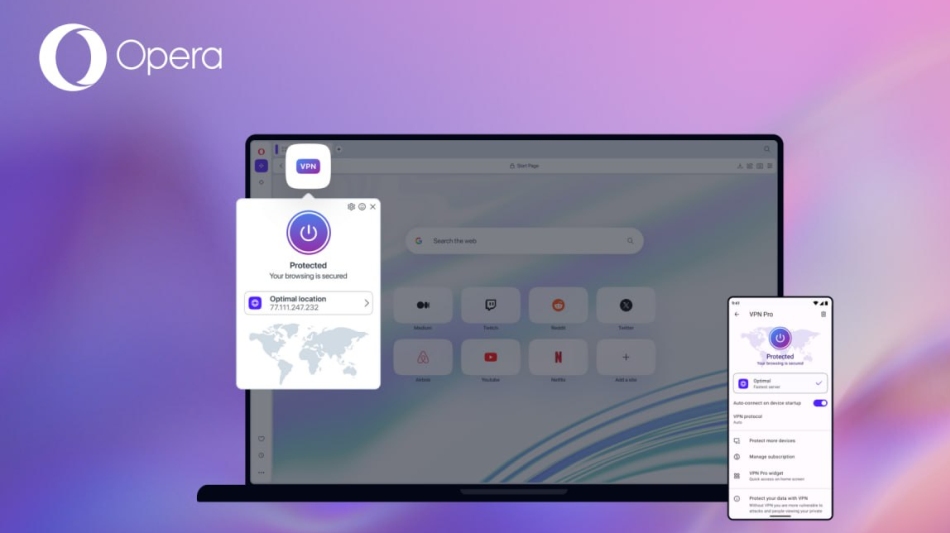
Opera has announced a major overhaul of its premium VPN Pro service, promising significantly improved performance, enhanced privacy, and broader global server coverage.
The new version, available from today, introduces a modern infrastructure built around the open-source Lightway protocol, along with a revamped server network offering access to 48 global locations.
The upgraded VPN Pro is now integrated into Opera One, Opera GX, and Opera for Android, providing device-wide protection across Windows, macOS, and Android devices, up to six per user. Unlike the free VPN included in Opera's browser, which is limited to in-browser traffic only, VPN Pro encrypts all traffic across the operating system, aligning more closely with what users expect from a full VPN.
A key technical addition is the adoption of the Lightway protocol. Developed with a focus on speed and efficiency, Lightway is designed in Rust and includes post-quantum cryptographic protections by default. Opera claims this change brings lower latency, faster connection setup, and improved battery performance for mobile devices, along with the reliability benefits of a purpose-built VPN transport protocol.
The improved infrastructure now guarantees a minimum 10Gb/s bandwidth per server, expanding the previous network by 15 locations to a total of 48 worldwide. This marks a considerable upgrade for VPN Pro users, especially in regions previously underserved by Opera's network.
Opera, a Norway-founded company publicly listed on NASDAQ, maintains its headquarters and most of its managerial operations in Oslo, although it was acquired in 2016 by a Chinese consortium led by Qihoo 360. The company markets itself as a privacy-focused browser provider, serving hundreds of millions of users globally with products aimed at secure and feature-rich internet experiences.
However, Opera's VPN offerings have drawn scrutiny from the privacy community. While the company asserts a strict no-logs policy for VPN Pro, our own in-depth assessment from January 2025 has raised concerns. The free VPN baked into Opera's browser has been criticized for operating more like a proxy than a full VPN, logging usage data, and partnering with third-party ad platforms, including Google and Facebook. These practices, buried in Opera's privacy policy, have led some to question the company's overall commitment to user privacy.
Opera stated to CyberInsider that its VPN infrastructure has been independently audited by both Deloitte (for logging policies) and Cure53 (for security), and affirms that no user data is stored, even for law enforcement requests. The company also emphasized that it is based in Norway and subject to GDPR and other European privacy laws. These are important assurances, but questions remain around how long-term commitments to no-log policies will be enforced or verified across the jurisdictions where Opera operates.
While the transition to a full VPN model with stronger encryption and protocol transparency is a step in the right direction, users concerned about privacy are advised to review Opera's updated privacy policies carefully.
Existing VPN Pro subscribers on desktop will be upgraded automatically, while mobile users will receive a prompt to update their app. New users can test the service with a seven-day free trial.
Update 7/1 – Article updated after Opera contacted CyberInsider to clarify some key points concerning user data privacy.







Leave a Reply